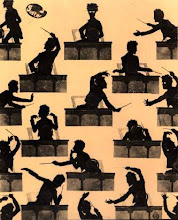Expectations are dangerous things.
"Hope is the first step on the road to disappointment", to quote a famous piece of Warhammer 40K Space Marine propaganda. A reader of The Prodigal Sorcerer, for instance (if any), would likely have expected an update; or otherwise expect, by now, that I have given up.
The expectation for an update has been met. But if one had stopped expecting an update, and begun expecting my giving up, I wonder if I should now apologise for disappointing them...
Another case of expectation for this first re-introductory post, now that the issue of my home internet connection has been sorted: the 100th Karajan anniversary year, 2008. Marking the maestro's 100th birthday, 2008 was to be a year of Herbert von Karajan releases like no other: box sets, remasterings, new releases galore.
And the question that has haunted me, maybe because I worry too much about these things, is: could the expectations of the Karajanophiles possible be met, by "Karajan year 2008"?
I think mine have now been fully met. After set upon set of highly interesting Karajan re-releases (including his complete EMI catalogue), and a surely-fascinating set of his first 'own' Salzburg Festival (which could have been issued any time), finally, a true anniversary release:
This is Karajan's final London concert, with his beloved Berlin Philharmonic just prior to their subsequent divorce and his death, as issued by Testament for the first time, on any format.
As soon as I saw the announcement for its release on the record label's website, I was shocked: here was one of Karajan's most famous concerts, that I had once seen described as one of the best concerts of an older concertgoer's entire lifetime, finally made available!
And here, to come back to the theme for this post, expectation kicked in: Brahms is one of my most cherished composers, the 1st Symphony a Karajan "calling card"; and the earlier studio recording of Schönberg's Verklärte Nacht one of his trademark "great records".
So given the general, critical and public, consensus on the profundity of Karajan's late live Brahms, and the specific reputation of that concert, I was expecting a miracle concert indeed!
Well, I got my wish.
I admit even my expectations left me unprepared for the Mahler-9th-primed string sound of the BPO on either piece, ferociously sensitive and bitingly sincere; the ravishing reading of the Schönberg; the titanic reading of the Brahms, easily bettering all six of his studio versions.
And for anyone who might pin my view on fanboyism, even within the Karajan discography, there is hardly anything like either of these performances. Only in his best work can one see this intensity, this drama, or this lyricism; and almost never* combined as they are here.
Even in general, I don't think I've ever heard a more sincerely-argued and stunning Brahms 1st - not even from Brahmsian-par-excellence Fürtwangler, usually my first choice for Brahms.
So on this evidence, one only hopes the late-80s Berlin concerts of the full cycle will one day see the light of day, perhaps as unexpectedly as this and an earlier London concert; preferably before 2108. And until such news arrive, I can at least update the Sorcerer more often.
(The earlier concert was a 1985 performance of Strauss' Ein Heldenleben and Beethoven's 4th Symphony. But since this is the Prodigal Sorcerer, not The Gramophone, I will refrain from turning this comment-oriented blog into the Karajan Review Weekly.)
*The string-heavy live 1982 Mahler 9th might be the only other sample of this sort of "late" sound from the Berlin Philharmonic under Karajan; albeit at an earlier stage than the 1988 concert discussed here. My comment on the "Mahler-9th-primed string sound" thus refers to the latter phase of Mahler 9th concerts Karajan conducted, ca. 1987. Presumably, that is where the BPO crystallised the expressive means so evident in 1988, to complement their trademark instrumental prowess.
More Posts To Come When I Have Time (TM):
- The Wrath of the Lich King!
- The Wrath of the Credit Crunch; or How Renfield Broke His Promise.
- Introducing: The Prodigal Sorcerer's Comparative Review.
